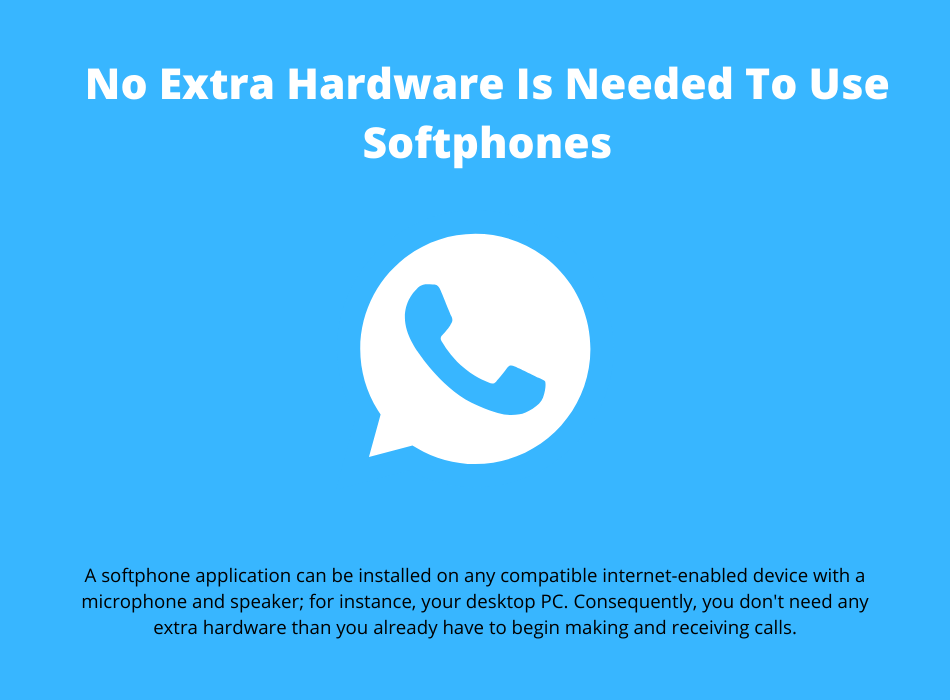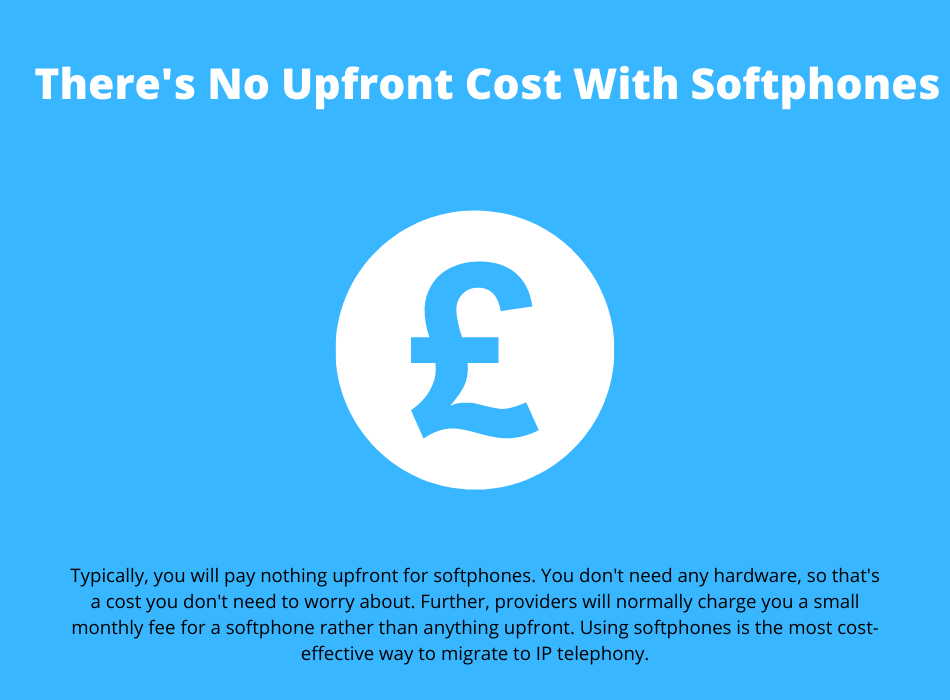Softphones versus deskphones is an argument I’ve had numerous times in the past. Some businesses swear softphones are the best whereas others swear deskphones are. To try and impartially settle this argument, I decided to write this blog post.
Before I begin the in-depth comparison, here are the benefits of both:
- Softphone Benefits:
- No extra hardware needed
- Quick rollout
- Ideal for remote working
- No upfront cost
- Deskphone Benefits:
- Greater reliability
- Not reliant on hardware not designed for making calls
- Requires less training
The above are the main benefits of softphones and deskphones, but that doesn’t really tell us which is the best. In this blog post, I’ll explain the benefits in more detail and advise on which option is best for your business.
Softphone Benefits
Here are the benefits of a softphone:
- No extra hardware needed
- Quick rollout
- Ideal for remote working
- No upfront cost
Not sure what a softphone is? Here’s a brief overview before I explain these benefits in more detail.
A softphone, which you may know as a soft client, is a piece of software you install on an internet-enabled device that allows you to make and receive calls using that device. For instance, you could install a softphone on your desktop PC. With a headset, you’d be able to make and receive calls using your business’s IP telephone system.

You can install a soft client on a number of devices, such as:
- Laptop
- Desktop PC
- Smartphone
- Tablet
It’s probable that you already have one or several of the devices mentioned above, which leads into one of the key advantages of a softphone: you probably already have the hardware you need. This can save you a fortune versus investing in IP phones, which can cost hundreds of pounds each.
As with IP deskphones, calls are made over the internet when using a softphone rather than a traditional phone line. If your internet-enabled device is already connected to the internet in some way (wired or wireless), you have all you need to begin making calls.
Anyway, now we’ve covered the basics of what a softphone actually is, let’s have a better look at those aforementioned benefits.
No Extra Hardware Needed
Already got an internet-enabled device with a microphone and a speaker? You’re good to go and start making calls using a softphone.
This is without a doubt one of the biggest advantages of using a softphone. In fact, this might in fact be the main benefit of using softphones rather than deskphones.

An IP telephone system requires very little hardware as it is, depending on whether you choose on-premises or hosted. However, purchasing deskphones can cost your business a pretty penny depending on the devices that you choose and the number of devices you need. VoIP phones can be purchased for as little as £60 or as much as £1,000, if not more. Multiply that cost by the number of staff you have and the costs are significant, even if you purchase cheap devices.
Of course, this upfront investment isn’t something that’s required if you use softphones instead. Since it’s just a piece of software on your internet-enabled device, you’ll pay a small monthly fee – if anything at all. Some providers chuck in their softphone application with the monthly licence cost.
Quick Rollout
Getting softphones set up for your employees is much quicker than getting them set up with hardphones (deskphones). There are several reasons that this is the case:
- No waiting on hardware to arrive: If you’re using deskphones, you’ll have to order them and then wait for them to arrive. You can set up a softphone immediately, so there’s no waiting around for anything to arrive. Simply download the software onto your device, configure it (your provider might handle this for you), and you’re ready to begin making and receiving calls.
- Easy installation: Installing a soft client onto your device is as easy as downloading any other application. If you’re using a smartphone, you’ll download the application from the app store on your device and then simply log in. Once you’re logged in, your device is ready to begin making and receiving calls. With deskphones, you’d have all the trouble of having to wire them into your network.
- Remote configuration: Because a softphone is just a piece of software, all the configuration can take place immediately. You won’t need to book an engineer visit to get all your handsets up and running. It really is as easy as installing an application on your chosen device and then logging in.
Softphone rollout is incredibly fast versus hardphone rollout when you consider all of the points above. Depending on the size of your business and the number of employees you have, your entire team could be set up within a day. That simply wouldn’t be possible with hardphones.
Ideal For Remote Working
A softphone is ideal for remote workers, or members of your team who are always on the move. This is because it can be installed on a number of portable devices, such as:
- Laptop
- Tablet
- Smartphone
By installing soft clients on these devices, your team can make and receive calls no matter where they are. So whether you have a team that are always on the move, or a team where some members work outside of the office, softphones are a handy solution.
No Upfront Cost
One of the main drawbacks of using deskphones is the large upfront cost if you’re purchasing your IP phones. IP phones can cost as little as around £60 or as much as £1,000+, so the upfront hardware cost could be significant depending on how many you need. On the other hand, there’s no upfront cost at all with softphones most of the time.

Most of the time, there will be a small monthly cost per soft client licence that you have. Some providers do include their softphone application for free in your monthly VoIP licence cost.
If you’re looking to migrate over to IP services as cost-effectively as possible, softphones are the way to go. The most you’ll pay is a small monthly cost, rather than hundreds if not thousands of pounds upfront on IP phones.

Deskphone Benefits
Here are the benefits of a deskphone:
- Greater reliability
- Not reliant on hardware not designed for making calls
- Requires less training
I don’t think I need to write an overview of what a deskphone is. However, it’s worth mentioning that the devices I’m talking about are IP deskphones that are compatible with a Voice over IP telephone system.
IP phones, depending on the models you choose, are often dependable devices that offer excellent voice quality and a ton of features that you don’t get on analogue phones.
Let’s have a look at some of the benefits of using deskphones rather than softphones.
Greater Reliability
Deskphones are typically more reliable than softphones. Softphones naturally rely on your PC or laptop to function correctly. If your device is running slow or you’re having some other technical issues, you may lose your softphone. If you have a lot of applications open or processes running, this can impact the performance of your softphone.
When you are using deskphones, you have devices dedicated to making and receiving calls. Ultimately, this means you have a more reliable solution. Hardphones don’t have other processes going on in the background, as they are solely used for calls. This will ensure good call quality every time, as performance will not be impacted by anything that you’re doing on your PC.
Not Reliant On Hardware Not Designed For Making And Receiving Calls
It’s impossible to use a softphone without a computer or laptop, or another device that you can install the software on. With this in mind, you could lose phone system functionality if your computer suddenly stopped working.
As I briefly mentioned before, a deskphone is not reliant on a computer to function. It is a separate device that doesn’t integrate with your computer, so you can use it regardless of how your computer is functioning.
Requires Less Training
Depending on the age and experience of your workforce, moving over to a VoIP telephone system is likely easier if you use deskphone. Deskphone are similar in appearance to traditional desk phones, so your workforce will already know how they function. If you start using softphones after your team have been using traditional phones for many years, there may be a bit of a learning curve and more extensive training needed.
Although softphones work similarly to a standard desk phone, using a piece of software is harder than using a deskphone for those with no training. If you want to integrate your new telephone system as smoothly as possible, deskphone would be the best option.
